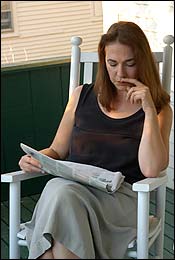I want to say I’m a fan of fiction writer Lorrie Moore’s work, but it’s more like I can’t believe Lorrie Moore’s work. In a good way. As a reader, I always seem to come away flabbergasted by how her mind works as a writer. I think things like, how on earth did she come up with this character or plot turn or where did she find it in her to express this? Extraordinary.

Photo by Louisa Conrad, originally appeared in New York magazine
Yesterday, my first day of recovery from arthroscopic surgery on my knee, I relaxed into some reading on my iPad and — bless Twitter — came across an interview with Moore posted in a Tweet by the Paris Review. It was conducted by Elizabeth Gaffney and, may I say, was almost as interesting as reading one of Moore’s stories in that it left me feeling I had no sense of her at all and yet a complete sense of who she is. Weird. And oddly appropos.
Last fall I took a literature course at NYU where one of the stories we read was Moore’s “People Like That Are the Only People Here” which had been published in The New Yorker. Another staggering piece that had me breathless as I read it. A slice of life of a couple whose baby was very sick and the whole scene from discovery to hospital. You cannot read Moore and not wonder if any or all of what you’re reading is autobiographical.
She addresses that and more in this Q&A with Gaffney. These were my favorite parts.
~ On what in her childhood contributed to her becoming a writer: “There was the usual dreaminess, I suppose. Also a shyness that caused me—and others—to notice that I could express myself better by writing than by speaking. This is typical of many writers, I think. What is a drawback in childhood is an asset to a literary life. Not being fluent on one’s feet sends one to the page and a habit is born.”
~ On why readers wonder if fiction is autobiographical: “It does seem to me to be a kind of animal impulse almost, a mammalian curiosity. For a reader to wonder about the autobiography in a fiction may be completely unavoidable and in fact may speak to the success of a particular narrative, though it may also speak to its failure.”
~ On the world of publishing: “It’s not really a writer’s business, and so I, like most writers, have been necessarily helpless before the whole thing. There is luck and stubbornness to help ward off despair, I suppose … So much about having a manuscript accepted is just out of your hands: the blood sugar level of a reader, the slant of light across a page, some personal event in an editor’s life that connects them profoundly with something you’ve written on page three. Who knows? There’s nothing you can do but write the best book you can.”
~ On process and the writing life: “It is a daily struggle that doesn’t even always occur daily. From the time I first started writing, the trick for me has always been to construct a life in which writing could occur. I have never been blocked, never lost faith (or never lost it for longer than necessary, shall we say) never not had ideas and scraps sitting around in notebooks or on Post-its adhered to the desk edge, but I have always been slow and have never had a protracted run of free time. I have always had to hold down a paying job of some sort and now I’m the mother of a small child as well, and the ability to make a literary life while teaching and parenting (to say nothing of housework) is sometimes beyond me. I don’t feel completely outwitted by it but it is increasingly a struggle. If I had a staff of even one person, or could tolerate a small amphetamine habit, or entertain the possibility of weekly blood transfusions, or had been married to Vera Nabokov, or had a housespouse of even minimal abilities, a literary life would be easier to bring about.”

